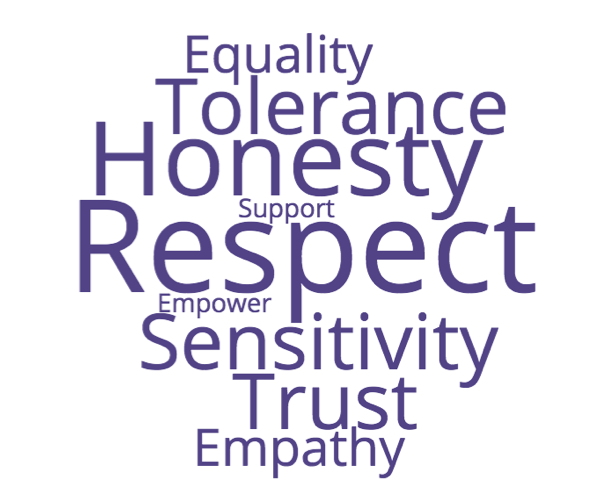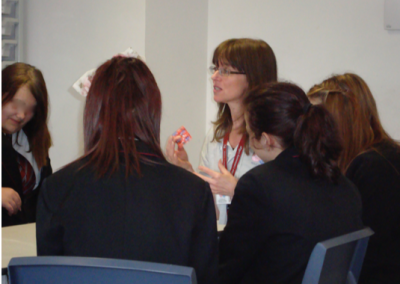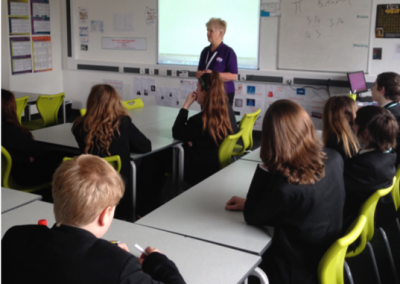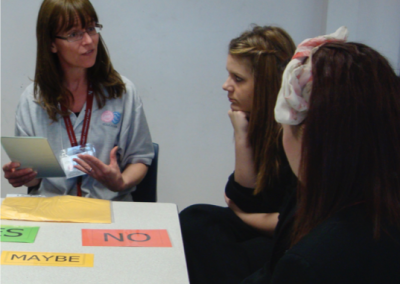Secondary RSE: Lessons for Life
Our programme for secondary schools 'RSE Lessons for Life', provides a broad range of lessons, which can be used as a whole scheme of study across the school, or as standalone lessons to enhance a school’s own taught programme.
An Introduction to the Programme
In 2016 Barnardo’s conducted a survey of over 1,000 young people aged between 11-15 years old, of these 74% said that all children would be safer if they had sex and relationship education suitable for their age. However, the quality of RSE provision across the UK is a lottery, in fact findings from another 2016 survey carried out with 2,000 young people by the Sex Education Forum found that:
- Half of the young people did not learn how to get help if they had been abused.
- 53% did not recognise the signs of grooming for sexual exploitation.
- More than 4 in 10 had not learnt about healthy or abusive relationships.
- 34% had not learnt about sexual consent.
At BigTalk Education we are committed to ensuring as many children and young people as possible receive high quality age appropriate relationship and sex education. Our programme for secondary schools RSE Lessons for Life, provides a broad range of lessons, which can be used as a whole scheme of study across the school, or as standalone lessons to enhance a school’s own taught programme. A report by Barnardo’s in 2018†, that conducted a broad literature review of past research that explored what young people think RSE should be like, concluded that young people often feel more comfortable being taught RSE by someone from outside of their school, like BigTalk Education’s specialist facilitators, as they find it is less embarrassing, they feel that specialists provide greater confidentiality and can result in a higher quality of delivery.

Our team focus on delivering factual information with no political or religious bias. However, our lessons and our team have an established set of values that we adhere to. These are respect, honesty, sensitivity, tolerance, trust, equality, empathy, support and empowerment.
Programme Details
The information below includes the lessons recommended for each school year group if taught in a whole programme. Each lesson is different with bespoke activities, resources and discussion topics designed to be delivered in a class room setting by our specialist facilitators.
The sessions have been split into two categories. The first are Essentials, these are core curriculum which cover the fundamental topics necessary for school to deliver. The second are Emerging, these sessions cover topics that young people want to be included in RSE in the 21st century. These sessions are an excellent way to enhance your schools’ existing lessons where you may already cover some of the more traditional elements of RSE but want to ensure your pupils are adequately safeguarded in the digital age.
All workshops are delivered within a single school period of 50 minutes to one hour. Some schools may choose to have our team visit on a drop-down day, whilst others choose to timetable regular lessons over the course of a few weeks, our team of 13 experienced staff are able to deliver a solution to suit your students and your school timetable!
Essentials:
Year 7+
- Introduction to Secondary RSE – The basis of knowledge of year 7 pupils can vary considerably dependent on the quality of their primary RSE provision or lack thereof. This lesson is designed to establish knowledge levels, ensure consistent accurate knowledge of core topics and back fill gaps. Themes covered include proactive safeguarding, reproduction, puberty, relationships, body image, gender and reliable sources of information.
Year 8+
- RSE Building on the Basics – In year 8 we address core themes within RSE, myth busting common misconceptions of young people around sex, risky behaviour, pregnancy, rights and responsibilities, as well as the law. The young people work with the team to clarify definitions of terms they have heard but may not understand, as well as answering questions in a safe confidential environment.
- Understanding Sexuality – We work with the young people to discuss changes in friendships and relationships as they may begin to develop emotional and romantic attachments. This covers all types of relationships and as with all of our programme, is fully LGBTQ+ inclusive. The workshop covers a range of themes that affect relationships and young people’s perception of what constitutes a healthy relationship. We address peer pressure, abusive relationships and gender stereotypes, as well as contemporary issues such as youth generated images (sexting), internet safety and the dangers of inappropriate websites which we demonstrate can warp a young persons’ view of social norms.
Year 9+
- Infections and Protection – At this point we introduce the young people to the dangers of sexually transmitted infections, ensuring they understand the short and long term effects, as well as which can be treated or cured and which can’t. The lesson includes information on safer sex, a demonstration of condoms and the local information relating to how, (when the time is right for them) to access them for free. Developing a greater awareness of the law, consent, better communication skills about safer sex and confidence to make good decisions are all objectives for this workshop.
- Sex: Your Decisions – Building on the themes of consent and contraception from the previous lesson, this session introduces more of the choices that young people need to consider before entering a sexual relationship. Covering the most up to date contraception information with details on efficacy, is critical to help young people make informed decisions. To underline the consequences of decision making, we highlight the effects of unplanned parenthood on potential mothers and fathers. We highlight the limited power of fathers in decision making, the effects of pregnancy for mothers, as well as the financial and lifestyle impact for both.
Year 10+ (Only where Year 9 workshops have already been delivered)
- Mates, Dates, Loves, Hates – This lesson is designed to aid young people identify abusive relationships and establish boundaries. Covering a wide range of abuse from verbal, emotional, financial, sexual and physical as well as isolation. By highlighting the warning signs of these we explore how young people could help their friends through these situations and where to get help, if they have concerns. To ensure the reinforcement of healthy relationships the team work with the group to discuss the positive qualities of their perfect partners.
- Paths to Parenthood – Suitable for year 10 onwards this lesson focuses on the routes to parenthood that today’s young people may encounter. As the average age of parents rises, so does the number of young people that may require fertility treatment later in life. This lesson also includes the path to parenthood for LGBTQ+ people, which has historically not been covered in RSE lessons. It is also within this topic that we touch on termination, statistics show that one in three women will have a termination before the age of 45, so sharing information on this subject may be of relevance to a significant number of students in the future.
Year 11+
- RSE: Show what you know – This is often the age at which some young people are thinking of becoming sexually active, so we review the essential material to ensure that the key topics are front of mind for the group. Covering consent, contraception, condoms and the responsibilities of young people, we once again highlight the ever present, potential risks of STIs and unplanned parenthood as well as the positives of pleasure and healthy relationships.
Emerging:
Year 7+
- Body Image – This lesson can be adapted for year groups from 7 right through to year 11. For both males and females outside influences can negatively impact body image, which can have repercussions on both mental and physical health as young people develop and into adulthood. By exploring how people think about their bodies, relative to media representations and social stereotypes (such as weight and gender) we relate this to self-esteem and body confidence.
- Friend or Foe? – This lesson raises awareness of personal safety, questioning what is normal, realistic and age appropriate in relationships, giving tips for spotting potential grooming and exploitation.
Year 8, 9, 10
- Reality Check – Whether it be video games, social media, Netflix, reality TV or adult websites, young people can easily and readily access media that represent relationships, sex, body image and gender in unrealistic and often highly sexualised ways. This lesson is designed to support pupils in navigating fictional and hyperbolic representations, helping them to understand that these do not represent natural, healthy relationships. We also address how to stay safe when looking for information about sex and relationships online and introduce trusted sources of factual information.
Year 9, 10, 11
- New Friends – This lesson suitable for years 9 through to 11 is exclusively about child sexual exploitation, the session addresses grooming in an offline setting and how this can escalate from assumed friendship to sexual exploitation. Our resources for this lesson draw comparisons of healthy and unhealthy relationships to distinguish exploitation from relationships with trust and respect. As CSE is often reported to friends first, we discuss with the pupils what they should do if a peer makes a disclosure of abuse or exploitation to them.
Year 10 – 11
- Realities of Parenthood – Suitable for either year 10 or 11, this workshop provides details on what to expect during pregnancy as well as the lifestyle changes faced by new parents. It gives young people insight on the true experience of parenthood, not the glamorised or heavily edited ‘reality’ of tv programmes or magazines. Myth busting of financial implications for young parents and the stress and strain of caring for a baby on relationships (including friendships) are core to this lesson.
We listen carefully to the thousands of children and young people we work with to identify emerging trends and issues that matter to them. Our programme is continually evolving to respond to the needs of young people growing up in contemporary culture. If you have a requirement for an RSE lesson provider in a topic area that is not listed above please get in touch as we have a wide range of resources and lesson plans not included in our current programme above. We are also able to create bespoke lessons based on school or community requirements as we have done previously with in conjunction with the gypsy traveler voice project amongst others.
Sources:
† http://www.barnardos.org.uk/involve_us_respect_us_web.pdf ‘Involve us, respect us: Engaging young people in relationships and sex education’, Barnardo’s, Accessed 17th September 2018
Got a question? Get in touch.
Request information on BigTalk Education's services for your school
Introduction to age appropriate RSE
Our guide to high quality, age appropriate Relationship & Sex Education for your child, helping you know what to expect from us.
BigTalk Education's Growing Up Safe Programme
Children want their parents to be the first people to talk to them about growing up, sex and relationships. Yet many parents say they lack confidence to answer their children's questions frankly, Schools are there to help, and BigTalk Education are here to support Schools and Teachers. Members of the BigTalk Team can come into School for a part or whole day, ensuring your children (and you as parents) are well educated to keep them safe, healthy and happy! Find out more >
BigTalk Education's RSE Lessons for Life
Our Programme in Secondary Schools uses a Youth Work approach to RSE delivery, participation, empowerment and inclusion are fundamental to its success. Our Team fosters a non-judgmental, relaxed, receptive atmosphere, which doesn’t shy away from sensitive issues.
Bodies, Babies & Bellybuttons
This book is a gentle introduction for children about their bodies and where they come from. A must have for all parents to help answer your children's questions in a simple, understandable and age appropriate way.







